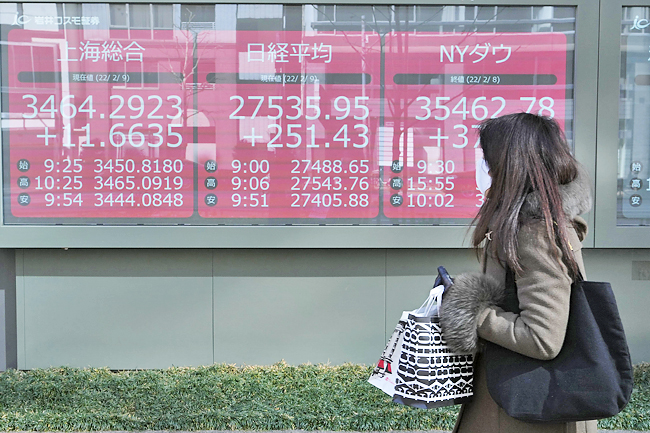BEIJING (AP) – Global stocks and Wall Street futures rose yesterday as investors waited for United States (US) inflation data for signs of how fast the Federal Reserve might pull back stimulus.
London and Frankfurt opened higher. Shanghai, Tokyo and Hong Kong advanced.
US inflation data are expected to show inflation rose to a four-decade high of 7.3 per cent in January, adding to pressure to control prices. Traders expect the Fed to hike rates at least four times this year, starting next month.
Wall Street’s rebound “suggests an attempt by the equity bulls to regain some control”, Yeap Jun Rong of IG said in a report. “Much will depend on the upcoming US inflation data to ease some concerns about tightening ahead.”
In early trading, the FTSE 100 in London rose 0.6 per cent to 7,612.25 and the DAX in Frankfurt added 0.7 per cent to 15,359.40. The CAC 40 in Paris advanced 0.9 per cent to 7,095.45.
On Wall Street, the future for the benchmark S&P 500 index was up 0.3 per cent. That for the Dow Jones Industrial Average was 0.2 per cent higher.
On Tuesday, the S&P 500 rose 0.8 per cent and the Dow gained 1.1 per cent. The Nasdaq composite advanced 1.3 per cent.
Smaller company stocks outpaced the broader market in a potential sign that investors are optimistic about economic growth. The Russell 2000 index of smaller stocks rose 1.6 per cent.

In Asia, the Shanghai Composite Index advanced 0.8 per cent to 3,479.95 and the Nikkei 225 in Tokyo gained 1.1 per cent to 27,579.87. The Hang Seng in Hong Kong was 2.1 per cent to 24,829.99.
The Kospi in Seoul rose 0.8 per cent to 2,768.85 and Sydney’s S&P-ASX 200 added 1.1 per cent to 7,268.30.
India’s Sensex gained 0.8 per cent to 58,316.17. New Zealand and Southeast Asia markets rose.
Markets have been volatile since Fed officials said in mid-December that plans to withdraw stimulus would be accelerated to cool inflation that is at multi-decade highs.
European and other central banks also are looking at when to withdraw stimulus.
The President of the European Central Bank, Christine Lagarde, said this week any rate hikes would be gradual. Investors expect the ECB to adopt a more hawkish policy at its March meeting after the board said last week inflation risks were rising.
Higher rates can depress stock prices by dampening economic activity and making it more expensive to borrow money to finance trading.
Economists expect today’s data to show US inflation accelerated to a four-decade high of 7.3 per cent in January.
On Tuesday, the yield on the 10-year US Treasury note, or the difference between its market price and the payout at maturity, rose to 1.96 per cent, its highest level since the start of the pandemic, from Monday’s 1.91 per cent.
Technology companies accounted for a big slice of the S&P 500’s rally. Apple rose 1.8 per cent.
Chipmaker Nvidia rose 1.5 per cent after announcing it terminated its plan to buy chip designer Arm from SoftBank.
Retailers and other companies that rely on direct consumer spending helped lift the market. Amazon rose 2.2 per cent and Home Depot gained 1.1 per cent.
In energy markets, benchmark U.S. crude lost 43 cents to USD88.93 per barrel in electronic trading on the New York Mercantile Exchange. The contract fell USD1.96 the previous session to USD89.36. Brent crude, the price basis for international oils, retreated 34 cents to USD90.44 per barrel in London. It lost USD1.91 on Tuesday to USD90.78.
The dollar declined to JPY115.36 from Tuesday’s JPY115.54. The euro advanced to USD1.1424 from USD1.1413.



















































